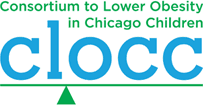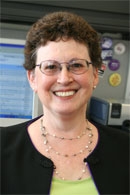by Katherine Kaufer Christoffel, MD, MPH, Founder and Medical and Research Director
At the CLOCC holiday dinner this year, I had the chance to present a short talk to reflect on and celebrate nine years of CLOCC. I shared thoughts on how CLOCC went from the twinkle of an idea of mine to the impressive force for change that now involves the many individuals and organizations in the consortium. Here are some highlights, which may be of interest to the broad range of people who are interested in CLOCC and its work.
The theme I used was ‘crossing oceans and moving mountains’, reflecting both my meandering path and its lessons, and also the path that CLOCC has taken: to create CLOCC’s broad coalition, we have had to cross boundaries as forbidding as oceans.
My journey started a few years after WWII, when I was born in NYC to two immigrants from Eastern Europe, who crossed oceans in their childhoods to reach a new life and who were actively committed to education and social justice. I was raised in Stuyvesant Town in Manhattan, a kind of urban suburb with a lot of green space and no through traffic. I had a fine education in the NY public schools, and then in college and medical school. Much of what I know about ground-up policy change was learned in anti-war activism in Boston during college and the years that followed. That work required base-building and coordination of effort around the campus and around the country. It taught me about compromise and how it is unwise to be too sure about things, as there is always much to learn and history has a way of showing those who are certain to be fools.
Those early years taught me lessons that I later applied to CLOCC. I learned that oceans can be crossed, life’s obstacles can be overcome, mountains of injustice can be identified and moved. That it takes many to achieve important goal. The successes of the civil rights and anti-war movements taught me boldness and optimism.
It was when I entered medical school that I dedicated myself specifically to health and health promotion. My choice of pediatrics was made because I was sure that caring for children would always remain compelling and optimistic. It was and it has been a pleasure and privilege working with children and families. I am humbled and always will be by the welcome granted to me to enter the private space that children share with their adults. The physical exams are intimate, of course, but in many ways that is the least of it. To be of help, I had to learn how families work, hour by hour, week by week, year by year. People trusted me to pry and spend time with them to learn about them. To cross the ocean that divided us. My attention gradually turned to problems related to primary calorie imbalance, both malnutrition and obesity, and this became my clinical focus for decades.
After residency, I began my public health studies. This took me beyond a purely clinical focus, and on to research. The research ultimately led to advocacy, particularly related to injury prevention, and most particularly to firearm injury prevention. I learned many lessons from that work and its challenges and successes, and these informed the design of CLOCC. Some memorable ones are these:
- Partner with others who have complementary work preferences and skills.
- Understand your limited perspective.
- Remember that many things can’t be controlled.
- Work in teams, which achieve the most and provide perspective.
In terms of oceans and mountains, this phase taught me not to stop at the oceans (between medicine and other realms), to take the measure of the mountains being moved and plan appropriately (when needed, audaciously), and to take a long view.
When evidence of the obesity epidemic showed up in my examining room, I saw that protecting kids from this scourge requires approaches well beyond what can be offered in the clinic. This was clearly a very big mountain indeed, spanning many areas of life and unjustly affecting the most those most in need. I took its measure and concluded that what was needed was a very comprehensive approach, with a focus on primary prevention and so an emphasis on young children.
What I proposed to funders was a multi-sector coalition that would address issues at multiple social levels, from patients to families to communities to society and policy. Chicago was fortunate that the Otho S.A. Sprague Memorial Institute invested in this early, when it was still an idea, and then for several years. With the effort of many and the support of numerous funders, CLOCC today connects regularly with over 1,200 organizations and over 3,500 individuals. Led by two extraordinary Executive Directors—Matt Longjohn and Adam Becker—and working in every social sector, CLOCC staff and partners have really built something remarkable! Our experience together confirms that the lessons I learned in other arenas—about oceans and mountains, audacity and optimism—are applicable in this one.
CLOCC has some big accomplishments that are worth savoring, including (in no particular order):
- This month saw CLOCC’s 36th Quarterly Meeting! Each one draws around 150 or more participants and is remarkable in its diversity.
- Chicago is home to the award-winning Inter-Departmental Task Force on Childhood Obesity (IDTF), midwifed by CLOCC, led by the Chicago Department of Public Health (CDPH), and now including 12 city agencies.
- CLOCC’s healthy lifestyle message, once a dream, is the well-established 5-4-3-2-1 Go!. It has been translated into several languages, is widely taught and used across Chicagoland, and is a living tool in 49 states and several nations around the world.
- CLOCC, under the leadership of Maryann Mason, CLOCC’s Community Research and Evaluation Director, developed a novel way to use school health forms to measure obesity prevalence in school kids. We documented that 26% were obese at school entry in 2003 and later that this rate had fallen to 23% in 2008, showing the power of the coordinated obesity prevention approach that CLOCC built.
- Healthy Places is the Chicago obesity prevention project funded by the federal Communities Putting Prevention to Work Program. CLOCC manages it, as the bona fide agent for the City, working closely with CDPH and other city agencies and with community groups. This project is meeting ambitious goals in areas that include increased access to healthy foods, improved safe use of parks and streets, healthy school environments, and increased breastfeeding support in the city’s 19 maternity hospitals.
- CLOCC has been tapped to share its experience with other cities, with researchers at NIH, with faith and community leaders gathered by the White House, and many others. People around the country know CLOCC and notice what we do.
In these and other ways that continue to increase and expand, CLOCC consistently crosses oceans to share practical approaches to moving the obesity mountain. Of course there is much still to be done, but we can already be very proud of what CLOCC is and has already done!
I hope the wonderful CLOCC team will always be audacious and optimistic, like the original twinkle of the CLOCC idea. And I hope that everyone in CLOCC will remember, in this important, collaborative work, the three things that form the heart of all work in public health, which I learned from a colleague who learned it from a colleague … and now some of you are learning them from me. The 3 Ps are easy to remember: Patience, Persistence … and a sense of humor.


